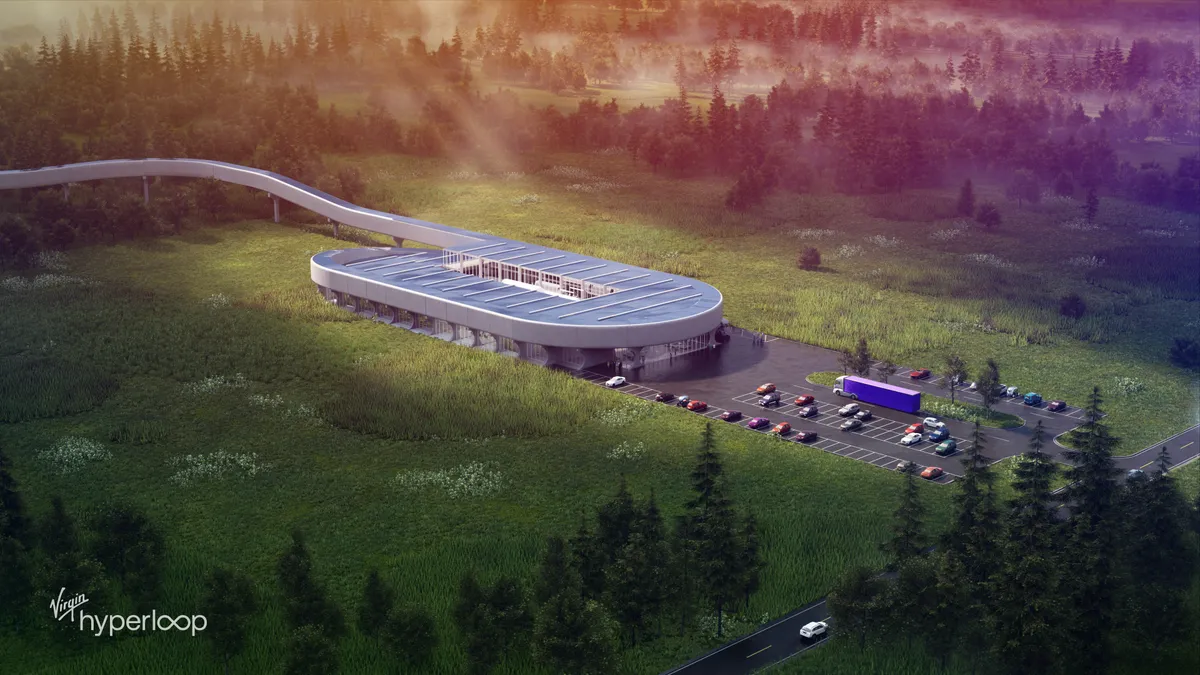Correction: A previous version of this article misidentified Virgin Hyperloop.
Dive Brief:
- Virgin Hyperloop has selected West Virginia as the location for its Hyperloop Certification Center (HCC), officials from the company and elected leaders announced at a press conference Thursday. The center will be built on an 800-acre site spanning Tucker and Grant counties in the state.
- West Virginia competed against 17 other states to land the HCC, which will include testing facilities, a training center on operations, maintenance and safety, a manufacturing facility and a certification track. The center — the first in the United States — will "lay the foundation for commercial deployment and operations across the USA and beyond," Virgin Hyperloop CEO Jay Walder said at the press conference.
- Construction of the center, which also has partnered with West Virginia University (WVU), Marshall University and others, is expected to begin in 2021. Local leaders said they expect it to create thousands of jobs, while WVU's Bureau of Business and Economic Research predicted the total economic impact of the center on the West Virginia economy to be $48 million annually.
Dive Insight:
For the nascent technology, Virgin Hyperloop said this announcement marks a major step forward in its efforts to gain certification and start commercial service. The company said it is aiming to achieve safety certification by 2025 and begin commercial operations in 2030. And has touted its bipartisan, bicameral support over the past few years from elected leaders at various levels of government who see it as a job creator, a way to alleviate crushing traffic congestion and an innovative way to get around.
With the company having found routes feasible in various states including Missouri and a corridor between Illinois, Ohio and Pennsylvania, Virgin Hyperloop said this HCC is the next step towards getting commercial service with 670 mile-per-hour speeds up and running. And West Virginia Gov. Jim Justice, R, said the HCC gives the state a national leadership role in those efforts towards commercialization.
"It is truly about more than West Virginia or our nation," Justice said at the press conference. "It is about transforming transportation, it is an idea, it is America at its best, for the entire world."
The HCC announcement also comes on the heels of the U.S. Department of Transportation (USDOT) Non-Traditional and Emerging Transportation Technology (NETT) Council issuing a guidance report on various emerging transportation options and how they can be regulated and made safe for wide use. The report says hyperloop can be safely integrated into the existing transportation system "through re-use, modification, and integration of existing (technical) standards from other transportation modes and (in some cases) non-transportation sectors," but has no specifics beyond that.
U.S. Transportation Secretary Elaine Chao, who formed the NETT Council last year, said in the press conference that the Federal Railroad Administration (FRA) will have primary oversight as it is mostly run on rails or maglev technology. Development on standards and best practices for safe operations have kicked off, Chao said, in moves aimed at "providing certainty to the innovators" and helping companies overcome regulatory challenges.
"Hyperloop developers now know where they can go to get questions answered and what to expect from the federal government, so they’ll be able to spend less time on government paperwork and more time on making hyperloop systems fast, efficient and above all, safe," Chao said.












